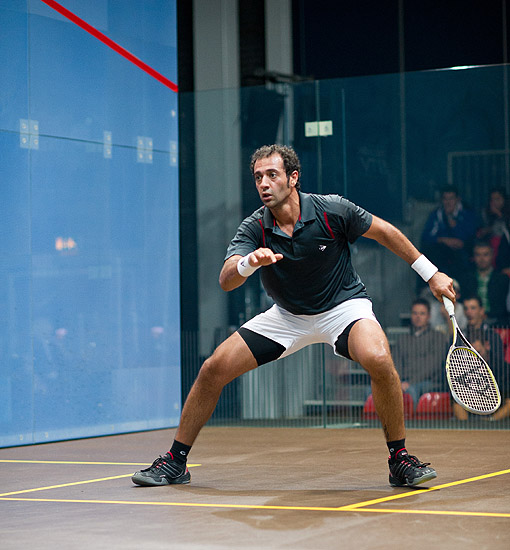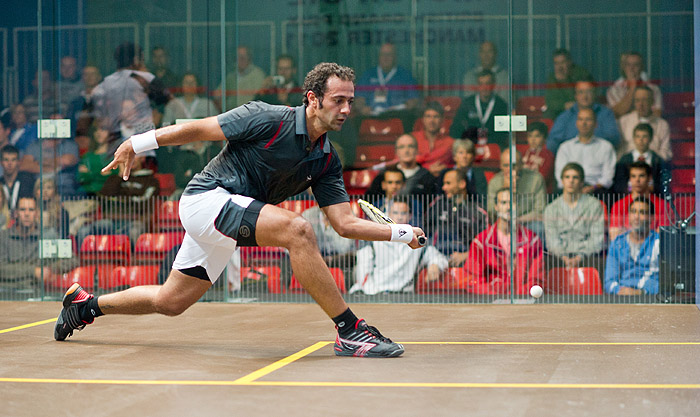Q & A With Egyptian Legend Amr Shabana
On The Eve Of The US Open
by Brett Erasmus, special to DailySquashReport.com

Photos courtesy Duncan Grove FRPS duncangrove.com
September 27, 2011 - This week I had the privilege of sitting down with Egyptian squash legend, Amr Shabana. I have never met anyone with such a record of achievement in the game (look him up if you don't know the name, in which case where have you been(!)) and so I was a little nervous asking some of these questions as I was not exactly sure how Shabana would respond. I was very relieved that Amr is not only a genius on the squash court but he is also a total gentleman, a great conversationalist, and has a real love for squash that is conveyed in the passion with which he speaks about the game. Oh, and he knows more about the history of the international game than anyone I have ever met. Hands down.
*******************************
BE: Well done on your recent performance in the British Grand Prix in Manchester. You lost in the semis against current world number one, Nick Matthew, a pretty impressive performance given that this was your first big tournament in half a year. Were you satisfied with the result, why the long lay-off and how did it feel to be playing competitively again?
AS: I was satisfied with the result, having been out entirely from the tour for six months. To be able to reach the semis of The British Grand Prix and challenge the top players was encouraging. Going forward hopefully I can keep getting better and stay healthy.
The long lay off was a result of a decision made by me to make a move to NYC. I always had that in mind - to move abroad and experience life in a new city in a country other than Egypt.
It felt good to be playing competitively again and felt good that even after such a long lay off to not be far off par with the very best in the game currently.
BE: It is amazing that so many of the world’s top professional squash players are based in New York City these days. The first to make the move was Wael El Hindi a year ago. And since January this year Alister Walker has been based here too. It would be truly incredible if you, as a four-time world champion and long time world number one, would do the same. We understand that you left during the turmoil in Egypt, but you could have gone to Canada where you have citizenship, so why the move to New York?
AS: I have always had a thing with NYC. I have been coming here over the past seventeen years at least three times a year. On two of these occasions it was to win the Tournament of Champions, in 2006 and 2007.
The city is a melting pot of cultures, and having a family, I always felt NYC was a great place to be. Don’t get me wrong, Toronto is an awesome place too, and is still an option for me.
As an athlete who spent most his life on the road, I grew up travelling all around the world, and I experienced and admired most of the countries I travelled to. So I have a lot of friends in both cities. NYC, however, I consider to be the squash hub on the American continent and I feel I could have a lot to offer here.
BE: We understand that you actually have the freedom to live in the US under a newly received visa? Congratulations. Given that you are a PSA touring pro how much time will you actually be in NYC and where will you train out of when you are here?
AS: Yeah, coming here in February with my wife and two daughters was to process my residency visa, which we are thankful to have now received, as we are now able to live and work here in an unrestricted capacity.
Currently, due to the congestion of the PSA tournament schedule this year, after processing my papers and now being able to be back fully on tour, my wife and I made a conscious decision to set ourselves up in New York going forward. We hope to make a smooth transition from Egypt to over here, and having two young girls we really need to. So, for now our time will be split between the two cities of Cairo and New York. I will be playing on the world tour initially anyway, but hopefully we will make the transition to New York as a family sooner rather than later.
There are a few clubs I train at in the city, I have made many good friends over the years that I have been coming to New York, so I don’t have a problem at all in that area.
BE: We hear that you are coaching these days as well as playing. Khaled Sobhy has asked you to get on court with his daughters, American juniors Amanda Sobhy and Sabrina Sobhy. How is this coaching going? Do you enjoy it and do you see potential in the American players on the world stage in future?
AS: I did coach a little bit this year given that I as inactive on tour. I got on court with a few promising squash players in NYC – I had training sessions with Julianne Chu and Jackie Chu for example. I also enjoyed being able to help Amanda and Sabrina; they are very nice girls and talented athletes, I didn’t spend an awful lot of time with them, but that time was well spent. I see potential in the American squash player on the world stage in the future, that is, if the stage is set is in the right direction… but that is not an easy thing to do.
BE: There is talk that you are principal in a brand new massive state of the art club currently being built in Cairo that will primarily serve in the development of top-level squash players. Can you confirm this and tell us about what the club will have an offer and how it will benefit Egyptian squash?
AS: A couple of years ago a friend of mine approached me with a vision he had. So, we started talking and soon found out that we were on the same wavelength, and the result is a brand called Blackball, which we are now very close to making it a reality.
We are due to launch the company’s fist project next July - a new sports club in Egypt which will house nineteen squash courts and six tennis courts along with various other sports. It’s a huge undertaking which we aim to duplicate once it is developed in order to make it possible for the kids back home to have venues in Egypt which will serve them fully and help them achieve anything they desire through sports.
BE: What is the climate like in Egypt right now, given all the political turmoil, and how does it affect you and your wife and two little girls. Are you all safe? We hope so.
AS: Any time that a country has a full-on revolution the good, the bad and the ugly will come out. Thankfully Egypt is a country full of patriots and great minds, and I am honestly confident when I say that, with hard work, Egypt could be great again, and perhaps even surpass the time of the ancient pharaohs.
BE: We understand you are a student of the game of squash and know the history of the game better than almost anyone alive. Who is your favorite squash player of all time?
AS: I am a squash student to the bone, having grown up in a family that played competitively in the highest levels. Rubbing shoulders with squash’s greatest players since the age of three was a privilege. I have so many great childhood memories.
It is not actually a fair question to ask who is the greatest, because there is no way one can give an answer to that question! I can name so many squash legends... I can tell you stories from the time of Abdel Fatah Pasha Amr (who was Egypt’s first great squash legend in the thirties) all the way up until today’s current squash champions. And each one has his talent, his story and his magic that is unique and different to any other…
BE: Over the last decade and a half you have had an incredibly successful playing career and have one of the best records of anyone who has ever played the game. You are also well known for having the fastest hands and the softest touch in the front of the court. At this stage in your career, do you have any particular squash goals left that you would still like to achieve?
AS: People would come up to me when I was a young junior and tell me that I could be World Champion and World Number One if I worked hard enough. I would thank them for their opinion and promise them that I would do my best.
And now I have somehow managed to win the World Open four times and held onto the Number One Ranking Spot for three years, and still continue to compete at thirty two years old after being on tour for seventeen consecutive years.
Having been given that opportunity to be where I am now, and what I have been able to achieve is a huge blessing given to me by God, and I am fully aware of that fact and it’s responsibilities. I pray that I didn’t let anyone down who believed in me.
BE: Thank you very much Amr for your time and for these very open responses. I know many fans will certainly feel like they know you better. And best of luck in the US Open this coming week.
AS: Thank you.

More from Brett can be found at: http://www.brettssquashblog.com/
Back To Main
